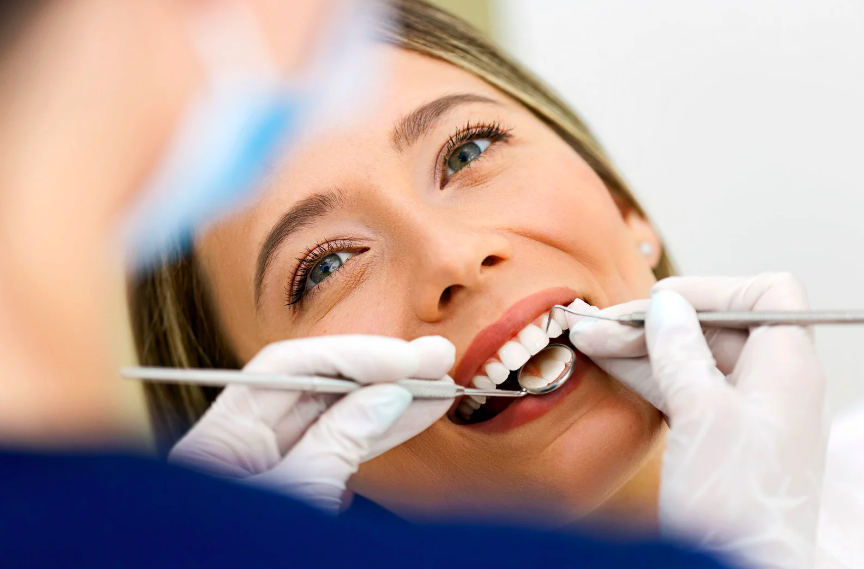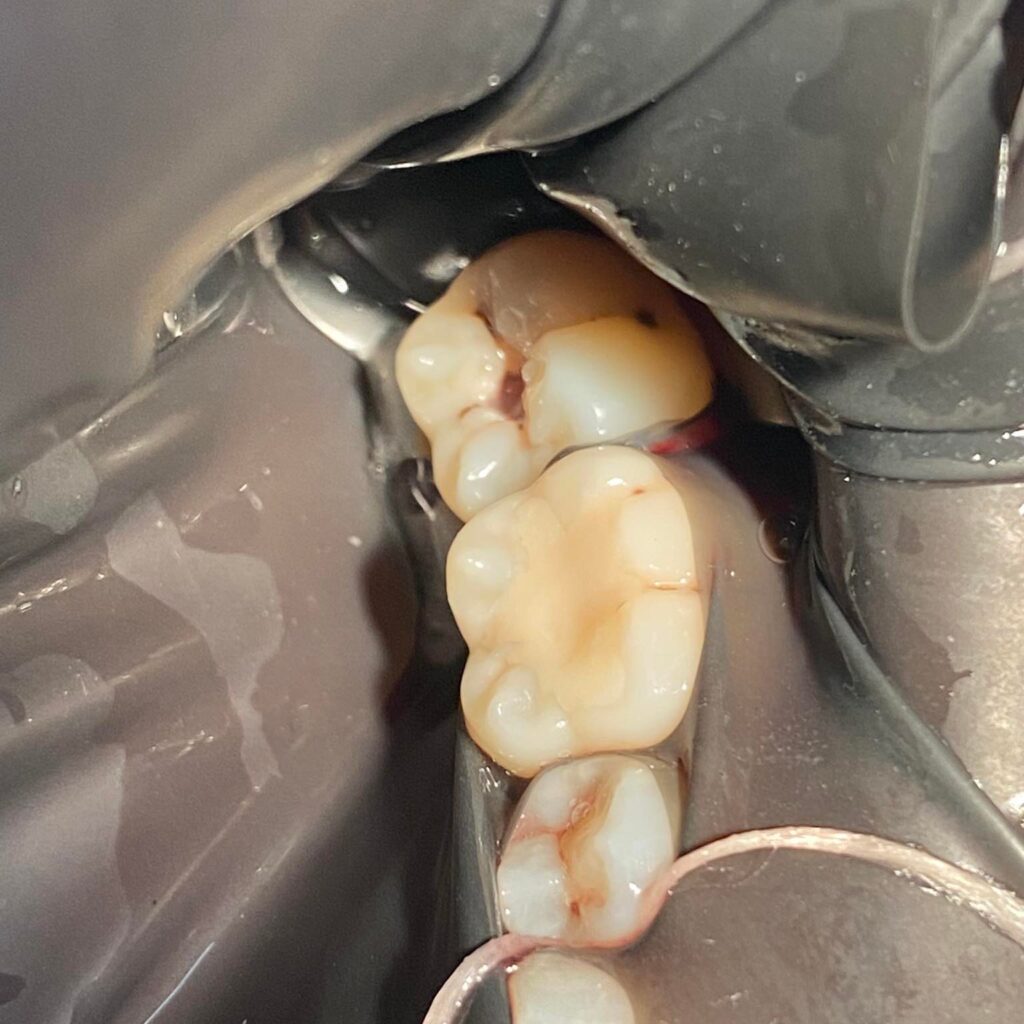Some people tell you that it will only take about 15 to 20 minutes; some people say it will take longer than that; so now you’re confused- how long does a dental cleaning take?
To answer your question, a usual dental cleaning could take as short as 15 minutes or as long as an hour, depending on the circumstances.
These circumstances that you and your dentist had to deal with are if you are an old or a new patient in the clinic, how much cleaning your teeth need, how many teeth you have, or if you have other existing dental problems that make dental cleaning more difficult.
How long does a clean take at the dentist?

Dental cleaning can be done in under 20 minutes, but in some cases, it can last for hours. This is because the dentist or the dental hygienist has to make sure that there are no remaining calcular deposits or plaque that are present inside your mouth that would ultimately cause inflammation in your gums.
That might have been confusing, so let’s break it down further.
Dental plaque or plaque is like a sticky film that can form on your teeth. It’s made up of bacteria, saliva, and tiny bits of food. Plaque is usually colorless, so you can’t see it easily. But if you don’t brush and floss your teeth regularly, the plaque can build up and become a problem.
The bacteria in plaque produce acids that can harm your teeth and gums, leading to cavities and gum disease. That’s why it’s important to brush your teeth twice a day and floss daily to remove plaque and keep your teeth and gums healthy.
Now, even if you brush your teeth daily and have superb oral habits, plaque can still accumulate in hard-to-reach areas such as in between your teeth or your molars.
This is where a dentist or a dental hygienist comes into the picture.
A dentist or dental hygienist use manual and ultrasonic scalers that could help loosen or get rid of the plaque that accumulated on your tooth.
How painful is dental cleaning?
Having a dental cleaning is usually not very painful. Most patients describe it as mild discomfort rather than actual pain. During the cleaning, you may feel some pressure, vibrations, and scraping sensations as the dentist or dental hygienist removes the plaque and tartar from your teeth. However, the discomfort is typically minimal and temporary.
It’s important to note that everyone’s pain threshold is different, and some people may be more sensitive to certain sensations. If you feel any discomfort during the cleaning, it’s important to let your dentist or dental hygienist know so they can adjust their technique or provide additional comfort measures.
To make the cleaning as comfortable as possible, the dentist or dental hygienist will use numbing gels or local anesthesia if necessary, especially for patients with sensitive gums or teeth. They will also work at a pace that is comfortable for you, taking breaks if needed.
Remember that dental cleanings are an essential part of maintaining good oral health and preventing dental problems. The slight discomfort or temporary sensations during the cleaning are well worth the long-term benefits of a healthy smile and reduced risk of dental issues.
If you have any specific concerns or questions about the pain or discomfort you might experience during a dental cleaning, please feel free to ask. Your comfort and well-being are important to any dental health worker, and they will do their best to address any concerns you may have.
How long after teeth cleaning can I drink or eat?
After your dental cleaning, it’s generally recommended to wait for about 30 minutes before eating or drinking anything. This allows enough time for any fluoride treatment or other substances applied during the cleaning to fully benefit your teeth.
During the cleaning, your teeth may have been treated with fluoride or other products to help strengthen and protect them. Drinking or eating immediately after the cleaning may wash away these beneficial substances before they have a chance to fully take effect.
Additionally, it’s a good idea to avoid consuming any staining substances such as coffee, tea, or colored beverages for the first few hours after the cleaning. This helps prevent the newly cleaned teeth from getting stained or discolored.
However, if you’re feeling thirsty or need to take any necessary medications, it’s generally acceptable to have a small amount of water after the cleaning. You can also use a straw to prevent experiencing hypersensitivity when you drink any hot or cold beverages.
If you have any specific concerns or if the dentist or dental hygienist provided any specific instructions regarding drinking after the cleaning, it’s best to follow their guidance. The dentist or the dental hygienist has tailored recommendations based on your individual oral health needs.
Remember, regular dental cleanings, in addition to good oral hygiene, are important for maintaining good oral health.
What do I have to tell my dentist before my dental cleaning appointment?
When advising a patient on what to tell their dentist before a dental cleaning appointment, you can provide the following guidance:
Medical History
Inform your dentist about any changes or updates in your medical history since your last appointment. This includes any new medications, allergies, or recent surgeries. Your dentist needs to have a comprehensive understanding of your overall health to provide safe and effective dental care.
Dental Concerns
If you have any specific dental concerns or issues, such as tooth sensitivity, bleeding gums, or persistent bad breath, make sure to communicate them to your dentist. This information will help your dentist address your concerns and tailor the cleaning process to your specific needs.
Dental Fear or Anxiety
If you experience dental anxiety or fear, it’s essential to let your dentist and dental team know before the cleaning appointment. They can provide additional support, explain the procedures in detail, and offer strategies to help you feel more comfortable and relaxed during the cleaning.
Previous Dental Work
Inform your dentist about any previous dental work or procedures you’ve had, such as fillings, crowns, implants, or orthodontic treatment. This information is important for the dentist to assess the condition of your dental work and ensure proper care during the cleaning.
X-rays and Records
If you have recent dental X-rays or records from another dental office, it’s helpful to provide them to your current dentist. These records can provide valuable information about your dental health and assist in making accurate diagnoses and treatment plans.
Changes in Oral Hygiene Routine
If you have made changes to your oral hygiene routine, such as using a different toothbrush, toothpaste, or mouthwash, let your dentist know. They can evaluate the effectiveness of your current routine and provide recommendations if needed.
Remember, open and honest communication with your dentist is crucial for personalized and effective dental care. By providing this information before your dental cleaning appointment, you can help ensure that your dentist has a comprehensive understanding of your oral health and can provide the best care possible.
How much is a dental cleaning?
The cost of a dental cleaning can vary depending on various factors such as the location, the dental office, the complexity of the cleaning required, and any additional treatments or procedures that may be included. It’s best to consult with your specific dental office or insurance provider to get an accurate estimate of the cost.
However, in general, the cost of a dental cleaning can range from around $75 to $200. This is a rough estimate and can vary significantly based on the factors mentioned earlier.
It’s important to note that dental cleanings are typically covered by dental insurance plans to some extent, and the out-of-pocket cost for the patient can vary based on their insurance coverage. It’s advisable to check with your dental insurance provider to understand your coverage and any potential costs you may be responsible for.
Additionally, some dental offices offer discounted rates or special packages for regular cleanings or as part of dental membership plans. It’s worth inquiring with your dental office about any available options to make dental cleanings more affordable.
Overall, the cost of a dental cleaning can be different because of a lot of factors, so it’s best to contact your dental office directly to get specific information about pricing and insurance coverage.




[…] How Long Does A Dental Cleaning Take […]